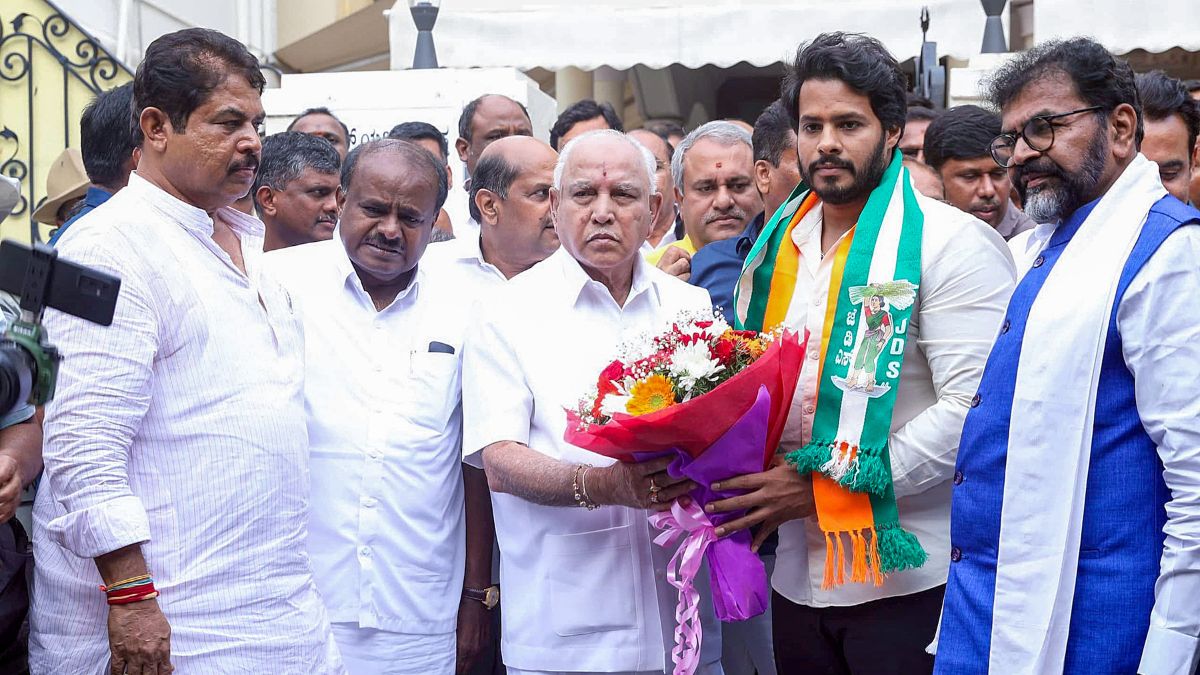The upcoming by-election in Channapatna, Karnataka, has thrown a significant curveball into the state’s political landscape. The National Democratic Alliance (NDA), a coalition led by the BJP, has chosen a surprising candidate: Nikhil Kumaraswamy, son of former Karnataka Chief Minister H.D. Kumaraswamy and grandson of former Prime Minister H.D. Deve Gowda. This unexpected move showcases the shifting alliances and complex power dynamics within Karnataka’s political scene, and throws into sharp relief the strategic calculations behind the NDA’s nomination. Nikhil, an actor and politician currently serving as the JD(S) State Youth Unit President, represents a calculated risk by the NDA. This article explores the implications of this choice and the potential impact on the upcoming by-poll.
Nikhil Kumaraswamy’s Candidature: A Strategic Gambit
The NDA’s decision to field Nikhil Kumaraswamy is a bold and high-stakes maneuver. While seemingly counterintuitive given his JD(S) affiliation—a party often seen as an opponent to the BJP—it reflects a strategic attempt to consolidate votes and capitalize on potential crossovers. His father, H.D. Kumaraswamy, has a strong history in the Channapatna constituency, having defeated CP Yogeshwara twice. The decision therefore aims to leverage the existing familial legacy and loyalty, while simultaneously aiming to win over a broader cross-section of voters beyond the traditional JD(S) base.
Family Legacy and Voter Base
Nikhil’s candidacy directly leverages his father’s successful track record and the enduring popularity of his grandfather, H.D. Deve Gowda, a respected figure in Karnataka politics. This established presence provides Nikhil with an inherent advantage, ensuring name recognition and garnering support among sections of the electorate loyal to the Gowda family and JD(S).
Targeting Crossovers
The NDA’s strategy goes beyond consolidating the JD(S) vote bank. They are clearly seeking to entice voters who might otherwise support the Congress. By selecting a candidate with proven links to this section of voters, the NDA aims to erode the Congress’s support and boost its own chances of securing a victory. This could lead to an effective splintering of the anti-BJP votes, weakening the overall opposition front.
The Opposition’s Response and the By-election Stakes
Nikhil Kumaraswamy’s nomination presents a significant challenge to the Congress party and its candidate, CP Yogeshwara. Yogeshwara’s recent switch from BJP to Congress adds another layer of complexity to the already charged political atmosphere. The former BJP MLC likely carried substantial support from previous BJP constituencies, thus creating a challenge for Yogeshwara in winning over traditional Congress voters while managing his political repositioning in the minds of past voters. This contest potentially showcases a significant struggle for the loyalties and votes in the region.
CP Yogeshwara’s Challenge
CP Yogeshwara now finds himself in a tricky situation. He needs to win back the trust of the electorate he previously alienated. This requires deft navigation to prove his new-found political alignment to voters within the constituency who might remain wary about his previous association with the BJP.
Implications of the Channapatna By-Election
The by-election’s results will have broader implications. A win for Nikhil Kumaraswamy would be a considerable boost for the NDA, showcasing its electoral prowess and strategic adeptness. For the BJP, a victory could potentially reaffirm its dominance and further its expansion in the region. A loss, however, would offer valuable lessons on coalition management and campaign strategizing, impacting their confidence levels heading into future elections. Conversely, if Congress secures a win, it would be an important success and could signal a significant shift in the political climate leading up to further state-level and parliamentary elections.
The Broader Political Landscape of Karnataka
The NDA’s decision to field Nikhil highlights the fluidity of political alignments in Karnataka. The strategic alliances between the BJP and JD(S) are far from unprecedented in recent times. While presenting unexpected political coalitions, they often create alliances that shift to match the broader election needs and gain in potential political capital. It’s important to view the Nikhil nomination in the context of wider state-level politics as the move reflects changing party alignments. Analyzing this event further reveals intricate calculations and tactical strategies in play beyond what seems like just one single-candidate contest. In the run up to state and parliament elections, all strategic considerations become extremely crucial.
Shifting Alliances and Coalitions
The alliance between the BJP and the JD(S), even in this isolated instance, emphasizes the shifting political dynamics in Karnataka. It reveals a calculated move where the alliance and tactical positioning of politicians exceeds and overrides ideological alignment as factors in candidate choice. Furthermore, the nomination suggests the possibility of the BJP’s reliance on local power brokers and leveraging local connections rather than purely focusing on core ideological constituencies. The situation showcases the political adaptability within the BJP in relation to candidate choice to increase their chance at gaining office.
Implications for Future Elections
The outcome of the Channapatna by-election will serve as a significant benchmark, shaping future electoral strategies for all participating parties. Analyzing the success or failure of this high-risk gamble would influence and predict future collaborations. The level of success achieved through the selection of Nikhil Kumaraswamy will also determine the broader trajectory of how future coalitions and alliance structures operate moving forward. It further showcases a key change in electoral political planning and implementation.
Take Away Points:
- Nikhil Kumaraswamy’s candidacy is a high-stakes strategic move by the NDA, aimed at consolidating votes and potentially attracting voters from other parties.
- The by-election outcome will have significant implications for future electoral strategies and political alliances in Karnataka.
- The nomination underscores the fluid nature of political alliances and the importance of local dynamics in Karnataka’s political landscape.
- The contest will reveal much regarding how to navigate evolving and shifting voter loyalties and also how to successfully negotiate coalitions within the state-level context.




